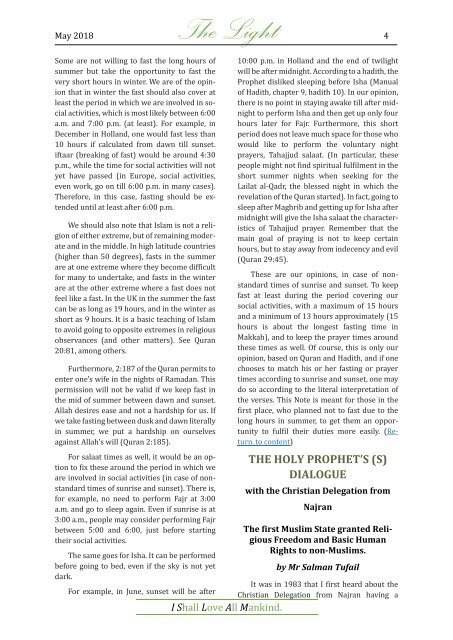The Light 2018 05 May Issue
English organ of the Lahore Ahmadiyya Movement (Ahmadiyya Association for the Propagation of Islam) presenting the Islam taught by the Holy Prophet Muhammad (s) - peaceful, inclusive, loving, rational.
English organ of the Lahore Ahmadiyya Movement (Ahmadiyya Association for the Propagation of Islam) presenting the Islam taught by the Holy Prophet Muhammad (s) - peaceful, inclusive, loving, rational.
You also want an ePaper? Increase the reach of your titles
YUMPU automatically turns print PDFs into web optimized ePapers that Google loves.
<strong>May</strong> <strong>2018</strong> <strong>The</strong><br />
<strong>Light</strong> 4<br />
Some are not willing to fast the long hours of<br />
summer but take the opportunity to fast the<br />
very short hours in winter. We are of the opinion<br />
that in winter the fast should also cover at<br />
least the period in which we are involved in social<br />
activities, which is most likely between 6:00<br />
a.m. and 7:00 p.m. (at least). For example, in<br />
December in Holland, one would fast less than<br />
10 hours if calculated from dawn till sunset.<br />
iftaar (breaking of fast) would be around 4:30<br />
p.m., while the time for social activities will not<br />
yet have passed (in Europe, social activities,<br />
even work, go on till 6:00 p.m. in many cases).<br />
<strong>The</strong>refore, in this case, fasting should be extended<br />
until at least after 6:00 p.m.<br />
We should also note that Islam is not a religion<br />
of either extreme, but of remaining moderate<br />
and in the middle. In high latitude countries<br />
(higher than 50 degrees), fasts in the summer<br />
are at one extreme where they become difficult<br />
for many to undertake, and fasts in the winter<br />
are at the other extreme where a fast does not<br />
feel like a fast. In the UK in the summer the fast<br />
can be as long as 19 hours, and in the winter as<br />
short as 9 hours. It is a basic teaching of Islam<br />
to avoid going to opposite extremes in religious<br />
observances (and other matters). See Quran<br />
20:81, among others.<br />
Furthermore, 2:187 of the Quran permits to<br />
enter one's wife in the nights of Ramadan. This<br />
permission will not be valid if we keep fast in<br />
the mid of summer between dawn and sunset.<br />
Allah desires ease and not a hardship for us. If<br />
we take fasting between dusk and dawn literally<br />
in summer, we put a hardship on ourselves<br />
against Allah's will (Quran 2:185).<br />
For salaat times as well, it would be an option<br />
to fix these around the period in which we<br />
are involved in social activities (in case of nonstandard<br />
times of sunrise and sunset). <strong>The</strong>re is,<br />
for example, no need to perform Fajr at 3:00<br />
a.m. and go to sleep again. Even if sunrise is at<br />
3:00 a.m., people may consider performing Fajr<br />
between 5:00 and 6:00, just before starting<br />
their social activities.<br />
<strong>The</strong> same goes for Isha. It can be performed<br />
before going to bed, even if the sky is not yet<br />
dark.<br />
For example, in June, sunset will be after<br />
I Shall Love All Mankind.<br />
10:00 p.m. in Holland and the end of twilight<br />
will be after midnight. According to a hadith, the<br />
Prophet disliked sleeping before Isha (Manual<br />
of Hadith, chapter 9, hadith 10). In our opinion,<br />
there is no point in staying awake till after midnight<br />
to perform Isha and then get up only four<br />
hours later for Fajr. Furthermore, this short<br />
period does not leave much space for those who<br />
would like to perform the voluntary night<br />
prayers, Tahajjud salaat. (In particular, these<br />
people might not find spiritual fulfilment in the<br />
short summer nights when seeking for the<br />
Lailat al-Qadr, the blessed night in which the<br />
revelation of the Quran started). In fact, going to<br />
sleep after Maghrib and getting up for Isha after<br />
midnight will give the Isha salaat the characteristics<br />
of Tahajjud prayer. Remember that the<br />
main goal of praying is not to keep certain<br />
hours, but to stay away from indecency and evil<br />
(Quran 29:45).<br />
<strong>The</strong>se are our opinions, in case of nonstandard<br />
times of sunrise and sunset. To keep<br />
fast at least during the period covering our<br />
social activities, with a maximum of 15 hours<br />
and a minimum of 13 hours approximately (15<br />
hours is about the longest fasting time in<br />
Makkah), and to keep the prayer times around<br />
these times as well. Of course, this is only our<br />
opinion, based on Quran and Hadith, and if one<br />
chooses to match his or her fasting or prayer<br />
times according to sunrise and sunset, one may<br />
do so according to the literal interpretation of<br />
the verses. This Note is meant for those in the<br />
first place, who planned not to fast due to the<br />
long hours in summer, to get them an opportunity<br />
to fulfil their duties more easily. (Return_to<br />
content)<br />
THE HOLY PROPHET’S (S)<br />
DIALOGUE<br />
with the Christian Delegation from<br />
Najran<br />
<strong>The</strong> first Muslim State granted Religious<br />
Freedom and Basic Human<br />
Rights to non-Muslims.<br />
by Mr Salman Tufail<br />
It was in 1983 that I first heard about the<br />
Christian Delegation from Najran having a














